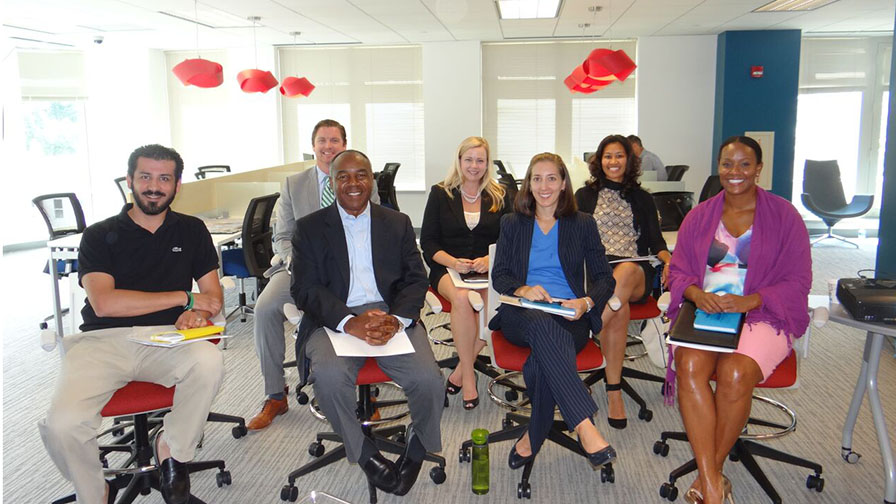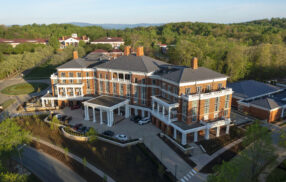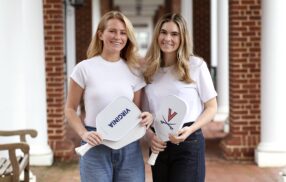
UVA Darden Network Expands With Veteran Entrepreneur Partnership
By Dave Hendrick
The University of Virginia Darden School of Business has long attracted a significant contingent of military veterans to its programs, as leadership and problem-solving skills learned in the armed services often translate well to the Darden experience.
Now, in a pilot effort to take part of the Darden experience beyond traditional MBA formats and recipients, Darden faculty and students have partnered with a veteran-focused business accelerator program to help bring entrepreneurship training to a cohort of veterans in the Washington, D.C., area.
Since August, Darden Professor Greg Fairchild and a rotating group of Darden alumni and Second Year students have led entrepreneurship courses at Bunker Labs DC as part of a program directed by Darden Executive Education.
The pilot program graduated a cohort of seven veteran-led companies in December, with plans for a new group in February.
Emily McMahan (EMBA ‘10) is the director of Capitol Post, an organization that aims to bring the veteran business community together in Washington, D.C., through a focus on business, career, and community and serves as the home of Bunker Labs DC. McMahan said the interest and early results indicated a program poised for success.
“Our first class was the pilot and we told everyone that — these are our early adopters,” McMahan said. “We have a product and an offering, and we told them we would be tweaking it. For our next class in February, we are really excited for the programming and line-up of companies we’ve attracted.”
McMahan said the “ideal” Bunker Labs startup is led by a veteran or veteran spouse with a concept that is innovative and addresses a clear market need. With added instruction and support, the accelerator aims to build sustainable and scalable companies.
While positioned toward the veteran community and active-duty military, McMahan said the next class will include a few civilian-led startups, as well.
The first cohort featured a number of promising businesses, including a company aimed at helping military families identify exactly where to live and a training program for schools to help them handle threatening situations.
In working through cases with Darden instructors, the students apply the lessons gleaned from case work to their own businesses immediately.
“It’s amazing to be able to bring Darden to a program where the rubber meets the road,” said McMahan. “They’re really applying what they learn from these cases in the now.”
In addition to the instruction the students gain from the Darden-affiliated teachers, the Darden School as a whole benefits by inviting a new constituency into the Darden community.
“I’m very interested always in ways we broaden the Darden circle,” Fairchild said. “This is what we’re about in terms of bringing high-quality education to people who are really at a life inflection point.”
Fairchild, whose father was a career army artillery officer, said he knew that the job market could be difficult for veterans, and was further struck by the incarcerated veterans he had met through the entrepreneurship courses he and Darden students teach in area prisons.
“I knew that, basically, things were challenging for veterans, more than most people recognize,” Fairchild said. “On the other hand, I knew that it was a population that includes people who move people and machinery and have led, and so you can see the ways that people who are veterans make a lot of sense as business people, and more specifically as entrepreneurs.”
Fairchild echoed McMahan’s assessment of the immediate impact of the case studies for a population that is actively engaged in the creation, or running of, a business.
“These people are really dealing with real things,” Fairchild said, “We’ve worked closely with Emily on figuring out how to get the right mix of theory and case and workshop, but I think we have a great partner who’s open to learning how to do that best.”
Coincidentally, for an initiative that will ultimately widen the Darden network, the Capitol Post idea was born out of the alumni network, beginning with a conversation between McMahan and her EMBA classmate Stephanie Landrum (EMBA ’10).
Landrum, the president and CEO of the Alexandria Economic Development Partnership, said she approached McMahan about launching Capitol Post as McMahan was considering transitioning out of a leadership role in an area company.
“When I met Emily, she had already made her transition from military service to entrepreneurship — and as CFO, I saw how she used the Darden curriculum to help grow the company,” Landrum said. “With her background as a veteran, an entrepreneur and a Darden grad, I knew she was the perfect person to help design, build and launch the program.”
Landrum said Capitol Post scouted a number of programs for support running the entrepreneurship courses, and was pleased to ultimately land on the school and curriculum with which she and McMahan were well versed.
“We were very excited to find a way to include Darden and work with the faculty and students to customize some of the best parts of our Darden experience to now share with the veteran business owners we are working with,” Landrum said. “The power of any network is based on some combination of quality and size, and we are proud to be contributing to both with Capitol Post and Bunker Labs DC.”
Bryan Yoon (Class of 2016), who spent eight years in the U.S. Army as an intelligence officer before coming to Darden, said the experience teaching in the program allowed him to both try his hand as an instructor and give back to a network to which he remains close.
“All of us in the Darden Military Association continue to feel a connection to the military and people who used to be in the military,” Yoon said. “There’s a particular set of experiences and a vernacular that accompany those experiences that only the people in that room are going to be able to understand, and there’s a unique opportunity to connect that to businesses.”
The Second Year student noted the characteristics of his students and military peers that made them particularly adept as entrepreneurs, including comfort with ambiguity and “a willingness to run through walls” to get results.
Yoon, who also teaches in the prison entrepreneurship program, noted the additional work that goes into trying to become fluent on the cases he led. Anticipating and addressing alternate interpretations of case work represented a particular challenge and gave him renewed appreciation for the efforts of teachers at Darden and in the broader educational ecosystem.
“I’m not necessarily an expert on entrepreneurship, but, on a day-to-day basis, I make myself into an expert on that particular case,” Yoon said, noting that he knew his audience came in each day prepared for the case and with the expectation that they would learn from the class discussion.
Yoon said he, too, always learned from the discussions he led.
“Planning for and leading case discussions is itself a unique and valuable leadership exercise,” said Yoon. “You start with a particular set of learning objectives and then have to shape the conversation in such a manner that allows for students to interact openly but also keep them on track.”
While the program remains in its infancy, Fairchild said he could foresee a sustainable and repeatable course emanating from the pilot. Moreover, basing the initial program in the Washington, D.C., area, which has a particularly large veteran population, means there will likely remain a rich talent pool from which Capitol Post can draw.
McMahan, meanwhile, said Capitol Post is thinking big in terms of the impact its clients can have on the wider business world.
“We believe we are changing the American economy,” she said.
The University of Virginia Darden School of Business prepares responsible global leaders through unparalleled transformational learning experiences. Darden’s graduate degree programs (MBA, MSBA and Ph.D.) and Executive Education & Lifelong Learning programs offered by the Darden School Foundation set the stage for a lifetime of career advancement and impact. Darden’s top-ranked faculty, renowned for teaching excellence, inspires and shapes modern business leadership worldwide through research, thought leadership and business publishing. Darden has Grounds in Charlottesville, Virginia, and the Washington, D.C., area and a global community that includes 18,000 alumni in 90 countries. Darden was established in 1955 at the University of Virginia, a top public university founded by Thomas Jefferson in 1819 in Charlottesville, Virginia.
Press Contact
Molly Mitchell
Associate Director of Content Marketing and Social Media
Darden School of Business
University of Virginia
MitchellM@darden.virginia.edu





